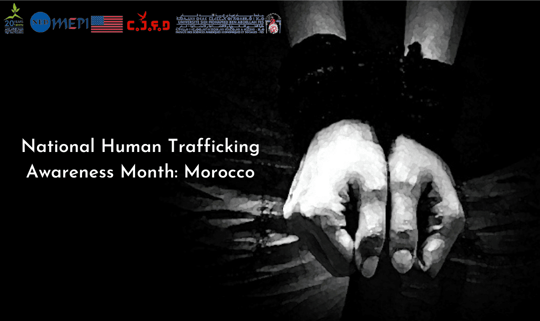National Human Trafficking Awareness Month: Morocco

January 2021 is National Human Trafficking Awareness Month. While countries across the world have their own national human trafficking laws that broadly align with UN human trafficking protocol, there are still people around the world who are victims of human trafficking and modern slavery. From 2017 to 2019, Morocco registered 719 victims of human trafficking. According to the US State Department’s 2020 Trafficking in Persons Report, Morocco is ranked as a Tier 2 country, meaning that it needs to continue to implement certain measures before its human trafficking approach can be considered satisfactory.
According to the UN protocol, special attention should be devoted to identifying victims and strengthening domestic frameworks for victim protection, objectives that can only be sustainably achieved through strengthened institutional efforts to respond to all aspects of human trafficking. Whether policy or services, national or community-based, all responses should be human rights-based, age and gender-responsive, and victim-centered to assist those most vulnerable and in need of protection and support. This is one of the very fruitful approaches that the legal clinic is using in order to have more impact on the beneficiaries and the participants of its activities.
One of the most vulnerable populations to trafficking in Morocco, sub-Saharan migrants, are put at more of a risk when they are relocated by the government without implementation of proper screening measures to recognize the signs of trafficking. Victims of trafficking may have trouble trusting others. They may also exhibit fear of the police, limited freedom of movement, seem to be in debt to someone, have no passport or say someone else is holding it, or have limited access to medical care. There are other more specific indicators that pertain to sexual exploitation, forced labor, child abuse, criminal activites, and domestic servitude.
Student clinicians at the Legal Clinic housed at University Sidi Mohamed Ben Abdellah’s Faculty of Economic and Social Legal Sciences in Fes (FSJES-USMBA) will be working with some of the most vulnerable populations in the Fes-Meknes region. Students have also received training on topics including but not limited to migration, asylum, and participatory communication.
Learn more about how you can support the efforts of the Legal Aid Clinic here.
The High Atlas Foundation is working in partnership with the Faculty of Economic and Social Legal Sciences at the University Sidi Mohamed Ben Abdellah (USMBA) in Fes to operate and grow a Law Clinic and Legal Aid program which actively engages students in experiential and service learning for the benefit of marginalized communities in the Fes-Meknes region. The project is funded by the National Endowment for Democracy (NED) and the U.S.-Middle East Partnership Initiative (MEPI).